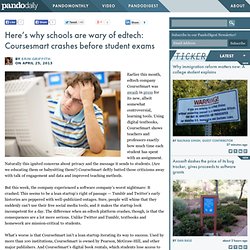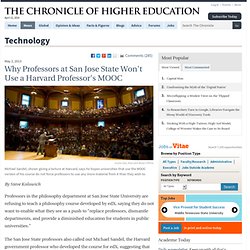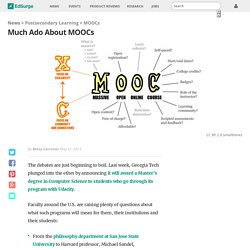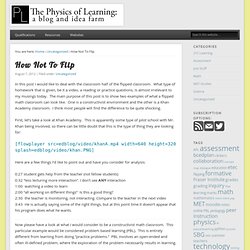

Reading, Writing and Video Games. The Trouble With Online College. First, student attrition rates — around 90 percent for some huge online courses — appear to be a problem even in small-scale online courses when compared with traditional face-to-face classes.

Second, courses delivered solely online may be fine for highly skilled, highly motivated people, but they are inappropriate for struggling students who make up a significant portion of college enrollment and who need close contact with instructors to succeed. Online classes are already common in colleges, and, on the whole, the record is not encouraging.
According to Columbia University’s Community College Research Center, for example, about seven million students — about a third of all those enrolled in college — are enrolled in what the center describes as traditional online courses. The dirty little secret of online learning: Students are bored and dropping out. Online education has been around for a long time.

But massive open online courses are finally making it respectable. Maybe even cool. Here’s why schools are wary of edtech: Coursesmart crashes before student exams. By Erin Griffith On April 25, 2013 Earlier this month, edtech company CourseSmart was awash in press for its new, albeit somewhat controversial, learning tools.

Using digital textbooks, CourseSmart shows teachers and professors exactly how much time each student has spent with an assignment. Why Professors at San Jose State Won't Use a Harvard Professor's MOOC - Technology. By Steve Kolowich Professors in the philosophy department at San Jose State University are refusing to teach a philosophy course developed by edX, saying they do not want to enable what they see as a push to "replace professors, dismantle departments, and provide a diminished education for students in public universities.

" Why K-12 online learning isn’t really revolutionizing teaching. Khan Academy: The hype and the reality - The Answer Sheet. Sal Khan responds to critic - The Answer Sheet. A guest post I recently published critiquing the Khan Academy received a great deal of response, including an e-mail from Salman Khan, founder of the academy.

Now here’s the next part of the debate: A response from the critic. Salman Khan, founder of the Khan Academy, in 2010. (Courtesy of Khan Academy) For those who may not know, the Khan Academy is essentially a library of more than 3,300 videos on subjects including math, physics, and history that are intended to allow students to learn at their own pace. Questions were raised about the quality of some of the math videos in the guest post mentioned above as well as in others elsewhere on the Web. Khan Academy: Readers weigh in - The Answer Sheet. Recent posts on the Khan Academy — including an e-mail I posted from founder Sal Khan — sparked a lot of interest and reaction from readers.

The Khan Academy is essentially an on-line library of more than 3,300 videos on subjects including math, physics, and history that are designed to allow students to learn at their own pace and for teachers to use as Sal Khan (Courtesy Khan Academy) instructional tools. One post, titled “Khan Academy: The hype and the reality,” by Karim Kai Ani, a former middle school teacher and math coach, and the founder of Mathalicious, took issue with the way Khan Academy videos deal with the concept of slope. Parody Critiques Popular Khan Academy Videos - Wired Campus. Image Courtesy of John Golden Khan Academy has 150 million YouTube views, 320,000 subscribers, and major support from the Bill & Melinda Gates Foundation—but that doesn’t mean the free online library of educational videos is perfect.

It doesn’t even mean the site is especially effective, say two math professors at Grand Valley State University. The Trouble With Online Education. Study Finds That Online Education Beats the Classroom. Much Ado About MOOCs. The debates are just beginning to boil.

Last week, Georgia Tech plunged into the ether by announcing it will award a Master's degree in Computer Science to students who go through its program with Udacity. The Reality of Virtual Schooling. Follow the links below to download this show as a podcast:Internet ArchiveAudioport (podcast) In this week's program, we explore the proliferation of virtual schools.

Virtual schools offer on-line education to primary and secondary school students without the added expenses associated with brick and mortar structures and unionized teachers and support staff. We hear opinions on virtual schools from well-known education scholars Jonathon Kozol and Diane Ravitch. Daphne Koller: What we're learning from online education. How Not To Flip » Physics of Learning Blog. In this post I would like to deal with the classroom half of the flipped classroom.

Why I Gave Up Flipped Instruction. A little over a year ago I wrote a post about the flipped classroom, why I loved it, and how I used it. I have to admit, the flip wasn’t the same economic and political entity then that it is now. The 5 Most Overhyped Trends in Education « Looking Up. For your perusal, a completely subjective list of five things happening right now in education that are getting lots of notice, energy and resources but don’t deserve it, and why I think we need to reconsider our collective love affair with them: 1. Are iPads and Other Classroom Gadgets Really Helping Kids Learn?
For the last six years, the buzz about educational technology has grown deafening. Schools across the nation are scrambling to figure out just how a new generation of technology—software and devices both in the marketplace and still to be developed—might better educate kids. The experiments are far-reaching. Currently, there are roughly 275,000 K-12 students from 31 states who are taking classes online.
Why Teaching Digital Citizenship Doesn’t Work « Looking Up. Given Tablets But No Teachers, Ethiopian Kids Teach Themselves. With 100 million first-grade-aged children worldwide having no access to schooling, the One Laptop Per Child organization is trying something new in two remote Ethiopian villages—simply dropping off tablet computers with preloaded programs and seeing what happens. Books, Not MOOCs. E-Learning for College Students. The Spring 2013 issue of Future of Children is a symposium on "Postsecondary Education in the United States.
" Straining the Quality of MOOCs: Student Retention and Intention. U.S. schools not making the grade when it comes to education technology. Technology Is Changing How Students Learn, Teachers Say. Minnesota bans Coursera: State takes bold stand against free education. The False Promise of the Education Revolution - College, Reinvented. Bill Gates’ $100 million database to track students. Text smaller Text bigger. Textbook Publisher Pearson Takes Down 1.5 Million Teacher And Student Blogs With A Single DMCA Notice. With Costs Rising Faster Than Tuition, Can Textbooks Last Long? How a single DMCA notice took down 1.45 million education blogs. How Even Highly-Targeted Censorship Can Lead To Overblocking. Flaw In YouTube Takedown Process Exposed. How Computerized Tutors Are Learning to Teach Humans.